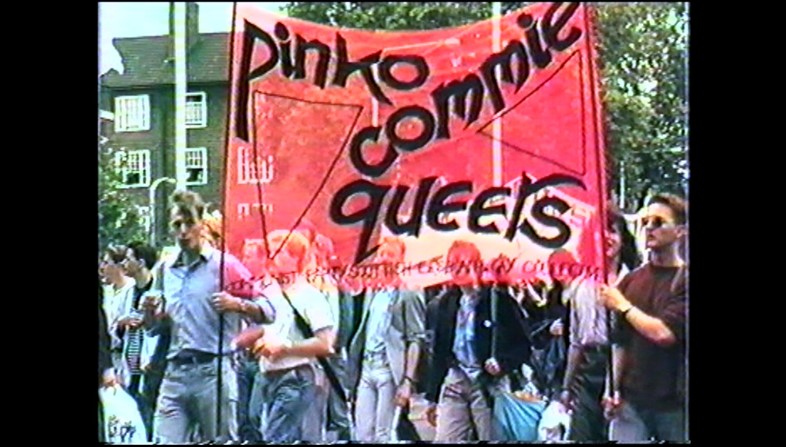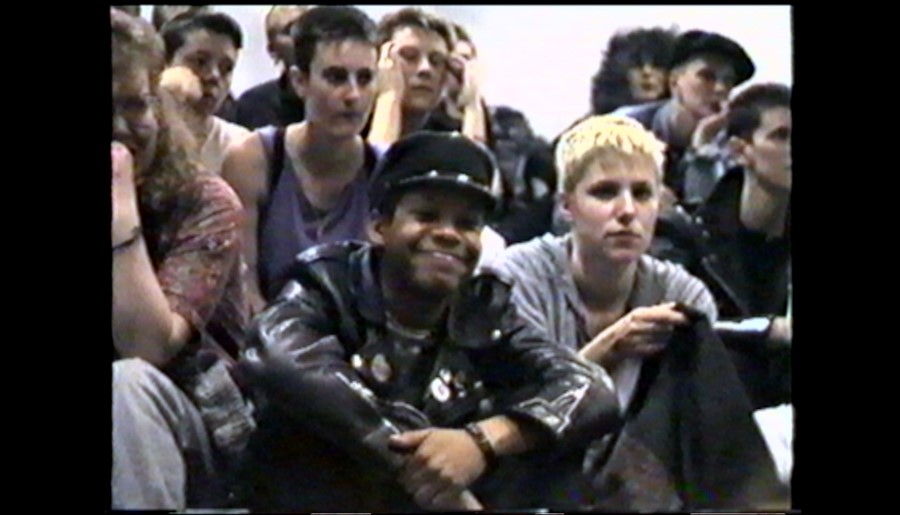New documentary Rebel Dykes tells the story of a group of friends who opened the world’s first known lesbian S&M club in the midst of Margaret Thatcher’s England
In the 1980s, Vauxhall became home to Chain Reaction – the world’s first known lesbian S&M club. Rebel Dykes, a film by Harri Shanahan and Sian A Williams, tells the story of the collective of queer women who founded the legendary south London club and created a community around it.
The group first met at Greenham Common, before eventually settling in Brixton’s squatting scene. Their surroundings, in Margaret Thatcher’s England, were far from forgiving. The women faced danger from homophobic street attacks, so lived a nocturnal life, eventually conspiring to open an S&M club.
Chain Reaction was a space where the women lived and worked together. Many were in polyamorous relationships and explored different political ideas and aesthetics. There were S&M performances and leather nights, where female sexuality was unashamedly on display. The Rebel Dykes were pro-sex work and pro-trans, at a time when such stances were even more controversial than they are now. Most of all, they were bound together by a rejection of the gendered expectation for women to be submissive and rule-abiding.

All this was happening at the beginning of the Aids epidemic, when a tide of homophobic sentiment was building in the UK press. Many of the businesses the Dykes set up, like selling sex toys and publishing their own lesbian fetish magazines, were hampered by Britain’s draconian “decency” laws. Soon, Section 28 began to be debated in parliament. Determined not to be silenced, the Dykes planned high-profile direct actions, like invading the BBC. They also organised demonstrations against Thatcher and protested her government’s response to the Aids crisis, galvanising the gay community at a time when they were under attack.
Before this documentary, the Dykes’ story had largely been forgotten. It is often left out of the history of queer movements, anarchist movements, punk and post-punk. There haven’t been any books, films or TV programmes made specifically about their subculture until now – unlike the gay male leather scene, which hasn’t experienced the same erasure. Rebel Dykes feels timely right now, given that there is a trend in the mainstream press for describing queer women as desexualised and apolitical. This characterisation is sometimes used to encourage animosity towards trans people – a marginalised group the Rebel Dykes became early advocates for, who are currently facing similar 1980s-style hostility in the press.
The film’s co-directors were both drawn towards the story by their own experiences of making art and performing in queer spaces. “I wanted to tell the story of the Rebel Dykes because I felt a kinship with their punk rebelliousness and their DIY approach to art and culture,” Shanahan tells AnOther. Williams felt a similar bond with the women. “I wanted to make the film because I’ve always felt a connection to the ethos of the Rebel Dykes,” she says. “Their art and music was a formative influence when I was playing in post-punk bands, and I was especially excited by the Rebel Dyke photographers that play with gender and identity and documented queer communities, all of which inspired my own visual art practice at the time.”
The film’s soundtrack is important in its own right. While developing the film, its makers discovered and digitised a treasure trove of largely forgotten feminist post-punk bands. Some of the music existed on a single cassette tape, because in the 1980s, all-women and lesbian bands rarely signed record deals. The bands include Mouth Almighty, first band of legendary Britpop guitarist Debbie Smith, one of UK’s most celebrated Black female guitarists.
Rebel Dykes is radical in that it centers women, non-binary and trans voices within its story. The central character, Debbie Smith, is a working-class Black woman. And the film’s creators are queer women or non-binary too, from the directors to the technical and even legal teams. Siobhan Fahey, an original member of the group who began archiving its history and brought the project to its directors, stayed on as a producer. “Rebel Dykes is my first feature film, and although it took six long hard years to produce, it has also been wonderful,” she says. “I have loved reconnecting with old friends and making new ones. Working on this film has been a great privilege.”
Rebel Dykes captures many of the elements that make queer communities special: defiance, resiliance and, of course, humour. It is a time-capsule of what it meant to be young and queer in 1980s England, while also introducing the world to the experiences of a specific and unique subculture.
Rebel Dykes is screening in selected theatres now.
